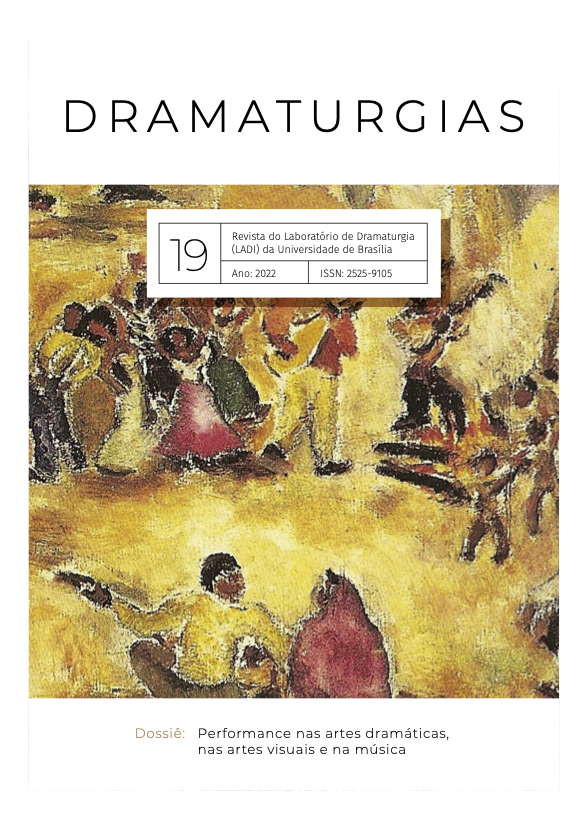Ancient Greek Greek Poetry and its performance: some initial data for eventual melodic compositions
DOI:
https://doi.org/10.26512/dramaturgias19.44689Keywords:
Greek melic, Performance, Ancient Greek music theoryAbstract
In this paper, I will discuss some initial information that we need to keep in mind when we think about the performance of archaic Greek melic poetry: metrics, performance occasions, musical instruments and harmonies cited by the various authors. Based on this data, I want to debate the extent to which it would be possible to have any idea of how the songs by Stesichorus, Bacchylides and Pindar, for example, were sung in their first performances and even when they were reinterpreted in situations different from the original performance context. In this way, I hope to encourage discussion on this topic so important for an appreciation that goes beyond reading the text.
Downloads
References
BARKER, A. Greek Musical Writings. Vol I: The Musician and his Art. Cambridge,
Cambridge University Press, 1984.
BARKER, A. Greek Musical Writings. Vol II: Harmonic and Acoustic Theory.
Cambridge, Cambridge University Press, 1989.
BARKER, A. ‘La musica di Stesicoro’, In: Quaderni Urbinati di Cultura Classica,
vol. 67, n. 1, 2001, p. 7-20.
BOWIE, E. L. ‘Early Greek Elegy, Symposion, and Public Festival’, In: RUTHERFORD,
I. (ed.) Greek Lyric. Oxford: Oxford University Press, p. 110-149.
COLOMER, L.; GIL, B. Arístides Quintiliano. Sobre la Música. Introducción, traducción
y notas de Luis Colomer y Begoña Gil. Madrid: Gredos, 1996.
D’ANGOUR, A. ‘The New Music: So What’s New?’, In: GOLDHILL, S.; OSBORNE, R.
Rethinking Revolutions through Ancient Greece, Cambridge: Cambridge University
Press, 2006, p. 264–83.
D’ANGOUR, A. ‘Music and Movement in the Dithyramb’, In: KOWALZIG, B.; Wilson,
P. (eds.). Dithyramb in Context. Oxford: Oxford University Press, 2013, p.
–210.
D’ANGOUR, A. ‘“Old” and “New” Music: The Ideology of Mousike’, In: LYNCH, T.;
ROCCONI, E. (eds.) A Companion to Ancient Greek and Roman Music. Cambridge:
Wiley/Blackwell, 2020, p. 409-420.
DAVIES, M.; FINGLASS, P. J. Stesichorus. The Poems. Cambridge: Cambridge
University Press, 2014.
DONADI, F.; MARCHIORI, A. Dionigi d’Alicarnasso. La composizione stilistica.
Trieste: Edizioni Università di Trieste, 2013.
GENTILI, B.; LOMIENTO, L. Metrica e ritmica. Storia delle forme poetiche della
Grecia Antica. Milano: Mondadori.
HAGEL, S. Ancient Greek Music. A New Technical History. Cambridge: Cambridge
University Press, 2010.
LYNCH, T.; ROCCONI, E. (eds.) A Companion to Ancient Greek and Roman Music.
Cambridge: Wiley/Blackwell, 2020.
MARTINELLI, M. C. ‘Documenting Music’, In: LYNCH, T.; ROCCONI, E. (eds.) A
Companion to Ancient Greek and Roman Music. Cambridge: Wiley/Blackwell,
, p. 103-115.
MATHIESEN, T. J. Apolo’s Lyre. Greek Music and Music Theory in Antiquity and
the Middle Ages. Lincoln and London: University of Nebraska Press, 1999.
PÖHLMANN, E. Ancient Music in Antiquity and Beyond. Berlin/Boston: De Gruyter,
PÖHLMANN, E.; WEST, M. L. (eds.) Documents of Ancient Greek Music. Oxford:
Clarendon, 2001.
PROBERT, P. Ancient Greek Accentuation. Oxford: Oxford University Press, 2006.
ROCHA, R. ‘Uma Introdução à Teoria Musical na Antiguidade Clássica’, In: Via
Litterae, v. 1, n. 1, 2009, p. 138-164.
ROCHA, R.(a) ‘Estesícoro entre Épica e Drama’, In: Phaos, 9, 2009, pp. 65-79.
ROCHA, R. ‘Plutarco. Sobre a Música’, In: SOARES, C.; ROCHA, R. Plutarco. Obras
Morais. Sobre o afeto aos filhos. Sobre a Música. Coimbra: Imprensa da
Universidade de Coimbra, 2010, p. 66-243.
ROCHA, R. ‘Lírica Grega Arcaica e Lírica Moderna: Uma comparação’, In: Philia &
Filia, v. 3, n. 2, 2012, p. 84-97.
SEAFORD, R. Tragedy, Ritual and Money in Ancient Greece. Cambridge: Cambridge
University Press, 2018.
WEST, M. L. Ancient Greek Music. Oxford: Clarendon, 1992.
Downloads
Published
How to Cite
Issue
Section
License
Copyright (c) 2022 Autores mantém os direitos autorais e concedem à revista o direito de primeira publicação

This work is licensed under a Creative Commons Attribution-ShareAlike 4.0 International License.
Autores mantém os direitos autorais e concedem à revista o direito de primeira publicação, com o trabalho simultaneamente licenciado sob a Licença Creative Commons Attribution que permite o compartilhamento do trabalho com reconhecimento da autoria e publicação inicial nesta revista.



